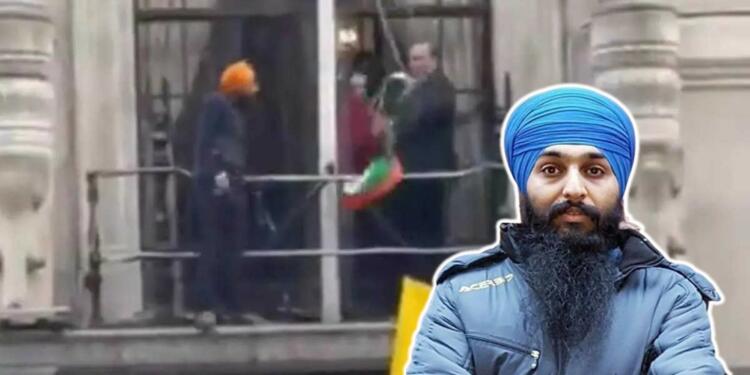Avtar Singh Khanda death: Recent weeks have seen the international diplomacy world shaken by the news of the death of Avtar Singh Khanda, a man who was no stranger to controversy. Known as a rabble-rouser and alleged mastermind behind the vandalism of the Indian High Commission in London, Khanda’s sudden death in a London hospital has fueled intense speculation and a flurry of theories about his mysterious end.
Let’s delve into the reasons behind sudden death of Avtar Singh Khanda, and why he got what he deserved.
Mastermind behind attack on Indian High Commission dead
Avtar Singh Khanda, with his robust association with the Khalistani separatist movement, was a force to reckon with. His radical actions and unabashed public stances made him a prominent figure in the separatist landscape. His admission to Sandwell Hospital in Birmingham about two weeks ago and his subsequent reliance on life support marked the beginning of a rapidly escalating health crisis that eventually culminated in his demise.
Also read: Jack Dorsey was a foreign spy, masquerading as a tech CEO
Initial rumors swirling around his death pointed towards a possible case of poisoning. However, medical reports countered this claim by indicating that Avtar Singh Khanda was suffering from blood cancer. While these reports have shed some light on his condition, the absence of an official statement from the hospital continues to leave room for speculation and conjecture.
Khanda’s infamy reached new heights following his involvement in the attack on the Indian High Commission in London. He had audaciously removed the Indian national flag and attempted to replace it with the Khalistan flag. This brazen act, which took place on March 19, led to his arrest and further entrenched his reputation as a contentious figure.
The theories behind his death
Despite the medical reports suggesting a natural cause of death, several theories continue to circulate about the circumstances surrounding Khanda’s demise. The first hypothesis proposes that he died of natural causes, specifically blood cancer, and chose to hide his ailment to avoid any perception of weakness. However, this theory, while noteworthy, doesn’t fully align with the character of the man known for his bold and confrontational demeanor.
A second theory, more sinister in nature, suggests that Avtar Singh Khanda might have been strategically eliminated by enemy agencies. Given his close links with various anti-India elements and possibly even the ISI, the parallels with the mysterious car accident that claimed the life of Deep Sidhu, another prominent supporter, cannot be ignored.
Yet another intriguing hypothesis surmises that Khanda was a victim of a slow, deliberate liquidation process. As far-fetched as this may seem, historical instances, such as the case of Wadie Haddad, a Palestinian terrorist who was secretly administered poison over time, lend some credibility to this speculation.
Also read: The VVIP Tantrums of ‘VVIP Sportspersons’!
Relief for Indian Forces
While the truth behind Khanda’s death remains clouded in mystery, one point of consensus is that his departure is likely to bring some respite to the Indian security forces. Khanda’s relentless efforts to tarnish the image of the Indian diaspora made him a perpetual thorn in the side of the authorities.
The life and death of Avtar Singh Khanda serve as a stark reminder of the intricate and often murky intersections of international diplomacy, separatist movements, and individual lives. As we delve into the details of his life and the ambiguities surrounding his death, it’s evident that Khanda’s legacy, like his life, continues to be a subject of intense debate and scrutiny.
Support TFI:
Support us to strengthen the ‘Right’ ideology of cultural nationalism by purchasing the best quality garments from TFI-STORE.COM





















